News and Announcements
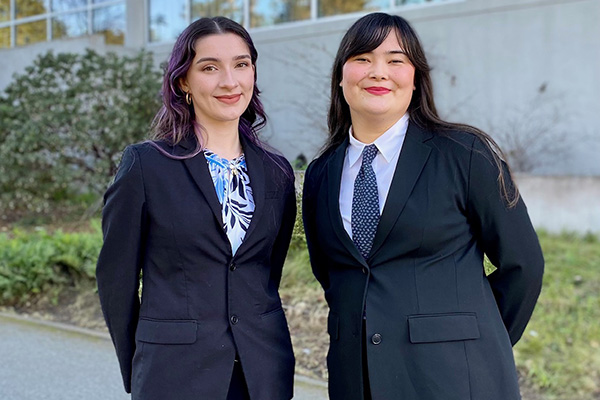
Two SF State students beat teams from colleges across the country to win the American Moot Court Association (AMCA) Brief Writing Competition. Olivia Clarke and Mayuu Kashimura’s brief prevailed over more than 200 others submitted by students from schools like Yale, Clemson and UC Berkeley.
“I was in shock when I first found out we won,” said Kashimura, a Political Science major who expects to graduate next May. “I remember calling Olivia as soon as I found out, and we were screaming.”
“I was ecstatic when I found out the news,” said Clarke, who’ll earn her Political Science degree this spring. “It was very surreal finding out that the brief we spent hours working on together had secured first place in the entire competition.”
Moot courts prepare students for the rigors of arguing a legal case. The brief competitions focus on the written arguments submitted by opposing sides. Clarke and Kashimura’s brief took the side of the respondent — the individual in the case rather than the government — to argue for a hypothetical woman’s right to use birth control as part of her freedom of religion and freedom of privacy.
“We picked this side because we felt like we were best equipped to argue a pro-respondent side,” said Clarke.
Clarke and Kashimura are members of SF State’s relatively young Moot Court team. The team was created in 2017 when Nicholas Conway came to SF State as an assistant professor specializing in public law.
“As a part of joining the University and my college community, I wanted to contribute something and build a program that would allow our students to shine,” said Conway, who’s now an associate professor. “I had previously coached moot court while a graduate student, and after taking the job at SF State I wanted to leverage my prior efforts to give our students a vibrant educational experience. Luckily, I had a receptive audience in my Political Science department and in the College of Liberal & Creative Arts.”
The new Moot Court team met with success almost immediately. Gators Yana Gagloeva (B.A., ’19) and Liam Sidebottom (B.A., ’19) were the 2019 AMCA National Brief Writing Champions, and the team was ranked No. 19 in the nation last fall. Two other members of the team — Alistair Lee and Mckenna Clausman — placed 12th in the respondent’s brief competition, while two more — Lucien Tomlinson and Kira Hammons — advanced to the final 16 in the oral arguments competition before being eliminated.
Though moot court is often seen as a way to prepare students for law school and the legal profession, Conway says the skills it develops are useful in any field.
“Moot court helps students develop important critical thinking skills,” he said. “As a part of the oral argument portion of the competition, students must argue both sides of a case during tournaments. In preparing their arguments over the course of several months, the students really investigate their legal questions inside-and-out. I believe it is important for students to be able to hear differing perspectives and critically evaluate them to enhance their reasoning skills and better understand their own views.”
Another benefit is the bonding that comes from working together as a team.
“When you’re a ‘mooter,’ you work hard and spend a great deal of time with your teammates in practices, traveling to competitions, actually competing together, etc.,” Conway said. “In those processes, students get to know one another and become friends. Former competitors from many years past are close friends to this day. I think that sense of friendship and community in moot court can be an enriching experience for a college student.”
Learn more about SF State’s Moot Court team or email Conway to get involved as a team member or supporter.
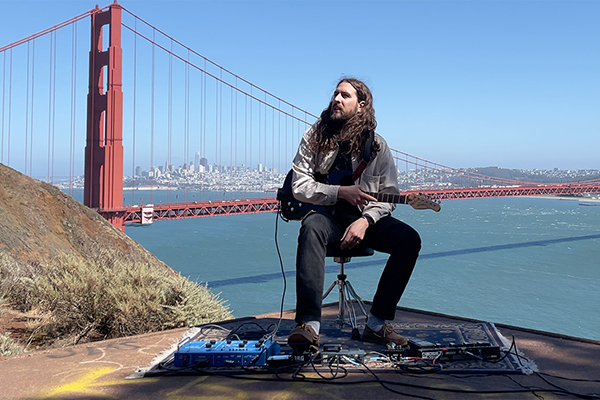
When hip-hop legend and actor André “3000” Benjamin released an album by surprise last fall, he was not the only multi-hyphenate involved. SF State alumnus Nate Mercereau is a member of the nine-time Grammy winner’s ensemble on the album, “New Blue Sun,” and on tour.
Mercereau (B.Music, ’10) is in a different universe of guitarists. He uses an electric guitar, a guitar synthesizer and a Midi-guitar.
“He hardly ever sounds like he’s playing guitar, but he’s an awesome guitarist,” Benjamin, of the hip-hop group OutKast, told National Public Radio. “He’s kind of like a magician in a way.”
On stage, Mercereau samples the band’s live performance by hand, using Abelton software to record a loop of sound, creatiing an in-the-moment composition. This improvisational technique creates a new sound with every note.
“I have a microphone going directly into the sampler, and I also plug my own guitar into the sampler,” Mercereau says. “I’m either sampling the sound of the group live with me, or I’m sampling myself live. ... The sample becomes my ‘instrument,’ pitched all up and down the fretboard.”
Mercereau’s magic is not just on guitar. He plays up to a dozen instruments on songs he has co-written for Lizzo, Shawn Mendes and Leon Bridges. Drums, piano, violin, French horn, glockenspiel, you name it.
Mercereau’s own recordings are more exploratory, describing them as exploratory, “music with a sense of discovery and “a searching quality.” In 2021 he garnered national press for an album of “duets” pairing his guitar work with the wind-blown hum of the Golden Gate Bridge.
Dissonant sounds
Before being admitted to SF State’s School of Music, Mercereau had to audition. He didn’t know it yet, but his ambitions would swerve in a different direction.
“They ended up accepting me as a guitar student with the caveat that I would also play French horn in the Wind Ensemble,” he said.
Exceeding that requirement, he played in over five other student ensembles and made a name for himself off campus.
“I was playing every possible gig I could,” he said. “I was playing weddings. I was playing restaurant gigs. I was playing bars and clubs all around the Bay and also in the church.”
Joining the SFSU Gospel Choir band, led by student Mike Blankenship, opened Mercereau to an entirely different way to play music. No longer did it have to be an academic, conceptual exercise.
“It was like, ‘Let’s get to the stuff. Let’s deliver this music. Let’s really play,’” Mercereau said, noting Blankenship’s mentorship. After graduation, they both joined Sheila E.’s band for five years of touring worldwide.
“Nate was one of those students who just has it. I could tell that major success was ahead of him,” said Paul Wilson (B.Music, ’08), the longtime staff technician for the SF State School of Music. “His musicianship was always off the charts, and he was also just the nicest humble guy.”
Deep listening
Mercereau is still absorbing lessons from SF State Professor Hafez Modirzadeh. Modirzadeh told students that he enjoys listening to two radio stations at the same time to hear how the dissonant sounds blend together. It took Mercereau years to decipher.
“I find through the years an influence in the small things that he did say to me, or even just a look in his eyes when he would walk by,” Mercereau said. “When he was talking about stuff like that, I wasn’t ready for it, but it was something that stuck with me. And now I think about those things a lot more.”
Mercereau thinks about Modirzadeh when sharing the stage with Benjamin’s ensemble. He appreciates the professor as “a creative thinker.”
Benjamin and each member of the “New Blue Sun” ensemble are also creative thinkers, on the same wavelength. Connecting on levels musical and personal, they practice “deep listening”: being present, open, emotional and thoughtful with each other.
“Each of us is bringing our whole lives to the moment of creation together,” Mercereau said. “I’m very into being here on the Earth, and I’m very into getting involved in things and feeling how it feels to be alive. To move through life with that level of awareness, it feels really powerful.”
Learn more about the SF State School of Music.
Photo by Minnea Bisset
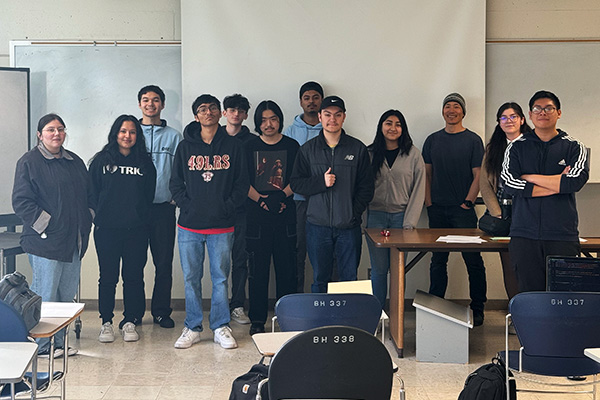
The 2023 – 2024 cohort of the Artificial Intelligence Scholarships that Improve Academic Achievement, Retention and Career Success (AI-STAARS) program consists of 20 freshmen with high academic potential and with unmet financial needs. They are receiving $190,000 in scholarships through this program, which is funded through the National Science Foundation S-STEM program.
In addition to the monetary award, AI-STAARS provides wraparound support. It offers participants weekly seminars during the fall and spring semesters, a winter-session coding boot camp and a summer session that introduces students to different branches in AI through hands-on projects.
In addition, creating a sense of community and belonging is a vital pillar of the AI-STAARS program. Participants are all first-year college students, and that can be a very intimidating experience. To alleviate the transition from high school to college, AI-STAARS emphasizes community and inclusiveness.
“I really do feel like I belong here,” one student said. “AI-STAARS, the student groups in the [Computer Science] Department — it’s just so inclusive and diverse, and I feel like there’s a place for me here and I fit in.”
Photo courtesy of Anagha Kulkarni
In recent years there have been many disturbing reports of suppression of academic freedom and freedom of speech at colleges and universities across the country. The Academic Freedom Committee (AFC) of the Academic Senate knows of instances where such suppression has occurred on the SF State campus.
The Academic Freedom Policy, which was last updated in 2013, does not reflect the realities of COVID, teaching online and especially some of the polarizing trends in society. These trends have contributed to a general intolerance, both within and outside academia, for academic freedom and the right to express opinions which, to some, may be unwelcome.
The AFC wants to hear from faculty as it updates the policy, in order to make it reflect the experiences of SF State more accurately and to help identify where the policy needs revising.
Teaching faculty (either lecturer, tenure-track or tenured): Please complete the survey. The survey is open until Wednesday, April 24.
The AFC is also planning an online panel discussion with experts on academic freedom and free speech in the University community. For questions about the survey, please email AFC Chair Jeff Greensite.
International Relations students successfully participated for the fourth time in the West Coast Model EU simulation, held March 1 – 3 at University of Washington in Seattle.
This year SF State was selected to serve as president of the European Council and to represent the country of Portugal. As co-presidents, students Zen Lewis and Brittany Hernandez had to manage a fractious and highly motivated group of heads of government from 27 EU member states (representing about 10 different colleges and universities from across the U.S. and Canada). Dan Butschmeyer did a great job representing Portugal’s national interests. The SF State students gained substantial conflict management and resolution skills as they engaged in debates with the students from the U.S. Air Force Academy and beyond.
The International Relations Department is grateful for the support from the Instructionally Related Activities Board for its support of these programs.
SF State’s Model U.N. students will represent the University at the Model U.N. Far West Conference in April.
Learning Glass is a video recording studio experience, allowing instructors to record a video with drawn visuals, similar to presenting with a whiteboard but without having your back to the camera. Academic Technology has reintroduced this service to all faculty as a new and exciting way to present instructional content. Examples of content to be presented in this way are complex math formulas, diagrams and flow charts.
The deadline to apply for Climate HQ Mini Research Grants is Friday, March 22, at 5 p.m. Faculty seeking collaborators for a project proposal may post to the climate justice mini grant collaboration forum.
For questions, please email Climate HQ mini grants coordinator Carolina Prado.
Are you passionate about community engagement and inclusive teaching practices? Do you want to play a vital role in shaping the educational experiences of students? If so, you’re invited to become a civic and community engagement faculty ambassador!
Working closely with the Institute for Civic and Community Engagement (ICCE), ambassadors champion community engagement practices among faculty members. By promoting impactful and inclusive teaching strategies, ambassadors aim to enhance student learning experiences and foster a sense of belonging within the diverse University community.
Under the guidance of the executive director of ICCE, ambassadors will serve a one-year renewable appointment. The commitment equates to about eight hours per week, with regular in-person meetings at ICCE.
The application deadline is Monday, March 25.
The Division of Undergraduate Education and Academic Planning has obtained funding from the Stupski Foundation to support a new faculty director of advising, starting fall 2024. The position is intended to support faculty advising across the campus and serve as a faculty liaison with the Undergraduate Advising Center.
The position is supported by six weighted teaching units of assigned time in fall and spring semesters. It is for a three-year term with the possibility of additional summer and winter session work. The position comes with some financial support in summer 2024 while working alongside the current director.
Responsibilities include:
- convening the five College Advising Councils
- serving as a liaison between faculty and professional advisers
- supporting faculty use of EAB Navigator
- providing training for faculty advisers as needed
- coordinating the Credit for Prior Experiential Learning program
- advocating at a university level for transfer student needs
The successful candidate must be a current SF State tenured or tenure-track faculty member, have extensive advising experience, be familiar with the use of EAB Navigator and be passionate about the role of faculty in supporting students through advising.
To apply, please email Lori Beth Way with a statement of interest and a curriculum vitae no later than Tuesday, April 2.
Academic Planning invites faculty to participate in a project to assess critical thinking skills of students in senior-level majors courses, or a different core competency (written communication, oral communication, quantitative reasoning or information literacy).
The purpose of this project is to use assessment to understand student learning and inform teaching. Participants are expected to attend a workshop to learn about the process and plan an assessment, carry it out, share the findings with colleagues and write a short report. Teams of two faculty each are encouraged.
For more information, please email Jane DeWitt. Please register via Qualtrics by Friday, April 5.
The Center for Equity and Excellence in Teaching and Learning (CEETL) seeks panelists for its mini-symposium, “Meeting the Moment: Using AI in the Classroom,” scheduled for Friday, May 3, 9 – 11 a.m., via Zoom.
Panelists will share 6 – 7 minute presentations on how they have addressed emerging artificial intelligence (AI) technologies in their classrooms. To propose a presentation, please email CEETL with a 200-word summary of the proposed presentation by Friday, April 5.
Join other staff, faculty, students and administrators in learning about how the University manages its finances. The University Budget Committee (UBC) seeks new members for one staff seat and one faculty seat beginning in August for three-year terms.
No experience is needed — This is a professional development opportunity for anyone. All levels of employees are welcome to nominate themselves or a colleague. The time commitment includes monthly UBC meetings during the academic year, reviewing meeting materials and potential opportunities to serve on an ad-hoc workgroup.
The nomination deadline is Thursday, April 11. Please email UBC for a nomination form.
Explore SF State is the University’s signature spring event for admitted students and their families — a day for them to visit campus, make connections and learn about life as a Gator. You can help them feel that they’ve found their home at SF State by serving as a volunteer ambassador.
Explore SF State will take place Saturday, April 20. Ambassador shifts are 7 a.m. – 2:30 p.m. Lunch will provided for all who help for the day.
Experience the magic of SF State’s 123rd Commencement ceremony on Friday, May 24, at Oracle Park, home of the San Francisco Giants. Please consider signing up as an ambassador — an integral role in the success of this monumental day. Ambassador assignments will be from 1:30 to 9:30 p.m.
As in years past, all ambassadors are asked to:
- Receive approval from their supervisor.
- Attend at least one informational training via Zoom for their assignment. The training dates are Monday, May 20, 1:30 – 2:30 p.m., and Monday, May 21, 10:30 – 11:30 a.m.
Many assignments involve large amounts of walking and standing. Please request any accommodations on the signup form under “Questions or requests.” Your support will help make this a special event for our graduating students, their friends and family members.
For questions, please email Dania Russell.
As a member of the SF State community, the Staff Council wants your voice to be heard! They hope that staff members will consider nominating themselves or a colleague for the open positions.
Important dates for the Staff council election, spring 2024:
- Nomination period: Monday, March 25 – Friday, April 12
- Voting period: Monday, April 22 – Friday, May 3
Current vacancies are in bargaining units 1, 2, 4, 5, 8 and 9: General Technical Services and 9: Tech Service.
For questions, please email the Staff Council. For more information, please visit the Staff Council website. Submit nominations via Qualtrics.
The council thanks campus community members for their contributions to the shared governance of SF State.
The nomination period for the 2024 – 2025 Academic Senate Elections is open through Friday, April 5. All faculty and staff are invited to review the list of committees and nominate themselves or colleagues for these positions. Each represents an opportunity to express your perspective and influence the future of our University.
Voting will take place Monday, April 15 – Friday, April 26.
Nomination forms:
- Lam Family College of Business
- College of Science & Engineering
- College of Ethnic Studies
- Graduate College of Education
- College of Health & Social Sciences
- College of Liberal & Creative Arts
- J. Paul Leonard Library
- All staff
Faculty are also encouraged to sign up for the Faculty Service Pool and Faculty Administrative Search Pool for 2024 – 2025. This is helpful to the Executive Committee and the Academic Senate for considering initial interest and willingness to serve on special committees and searches.
For questions, please email the Office of the Academic Senate.
The SF State Academic Senate will meet Tuesday, March 19, 2 – 5 p.m., at Seven Hills and virtually via Zoom for its 10th meeting of the academic year. Please email the Senate office for a Zoom link.
Agenda:
- Recommendation from the Academic Policies Committee: Revision to S21-296 Curriculum and Course Standards Policy, in first reading.
- Recommendation from the Faculty Affairs Committee: Revision to S20-145 Department Chairs and Equivalent Unit Directors Policy, in second reading.
- Recommendations from the Campus Curriculum Committee: program change requests, in second reading:
- Minor, Health Education (name change)
- Minor, Empowerment for Self Defense (revised)
- B.S., Interior Design and Architecture (library info added)
- Minor, Special Education (reduce number of units, technically substantive)
- Minor, Finance (rescind the suspension that never actually took place and update courses)
- Minor, Global World Music and Dance (name change, resituate program and update courses)
- B.S., Asian American Studies, Distance Education Authorization
- B.A., Race and Resistance Studies, Distance Education Authorization
- B.A., Latina/Latino Studies, Distance Education Authorization
- B.A., American Indian Studies, Distance Education Authorization
- Recommendation from the Campus Curriculum Committee in first reading:
- B.A., Ethnic Studies (move from College of Professional and Global Education to state support and other issues)
- B.A., Africana Studies, Distance Education Authorization
- Minor, Russian (name change and other requirement)
- Minor, Gay, Lesbian and Bisexual Studies (name change)
- Minor, Human Sexuality Studies (name change)
- Minor, Feminist Health Justice (name change)
- Graduate Certificate, Inclusive Early Childhood Practices (reorganization)
- Graduate Certificate, Decision Sciences (new)
- The Academic Senate will hear formal presentations from:
- Reggie Parson, associate vice president and chief of police; Frederick Smith, associate vice president for Equity & Community Inclusion; Lori Makin-Byrd, Equity Programs & Compliance; and Lawrence Birello, director of Student Conduct: “Introducing the Reporting Portals and Conflict Diffusion Workgroup”
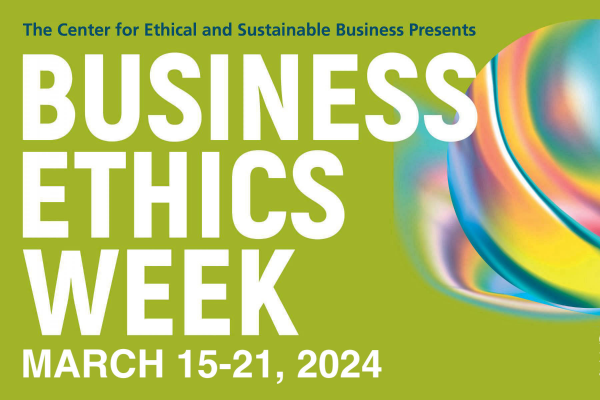
The Center for Ethics and Sustainable Business in the Lam Family College of Business invites the campus community to Business Ethics Week 2024.
Business Ethics Week focuses on three intersecting issues: social justice, sustainability and innovation. At the heart of this intersection lies the possibility of hope, where capitalism is reimagined, where innovation is inclusive and where ecosystems are regenerative.
Events:
- Monday, March 18, 3:30 – 4:45 p.m.: “Is It time To Regulate Cryptocurrency? If So, How?”
- Tuesday, March 19, 12:30 – 1:45 p.m.: “Dobbs, Uvalde, Gaza: How Should Companies Respond to Social Issues and World Events?”
- Wednesday, March 20, 6:30 – 7:45 p.m.: “Circular Design for Sustainability.”
- Thursday, March 21, 12:30 – 1:45 p.m.: “Who Can Afford to Live Here Anymore? The Fight for a Livable Wage in California and the U.S.”
Interact with the virtual world in the safety and comfort of a classroom. Academic Technology hosts a soft-launch opening of a new Augmented Reality/Virtual Reality (AR/VR) instructional space on Monday, March 18, 10 a.m. – 2 p.m., in Library 222.
This space will be available for instructors to bring their students in groups to experience AR/VR content. VR is gaining ground as one of the latest tools for computing. It is making exploring, training, learning and entertainment immersive.
The lab has five virtual reality headsets for students and faculty to use. Training and learning resources are only a few clicks away. Use Steam for educational games and simulators, including the latest games produced by top-tier developers.
Faculty members interested in health equity research and health social justice are invited to the Health Equity Institute’s “Spring Tea-time” on Tuesday, March 19, 2 – 3 p.m., in HSS 361. Meet colleagues, discuss shared connections and advocate for collaboration.
The Health Equity Institute is a campuswide research organization dedicated to advancing health equity through research, education and practice. Through research and action, the institute aims to create a more inclusive, equitable and just society and fosters dialogue and collaboration to achieve health equity.
Please save the date and RSVP to Monique Scott.
The Center for Equity and Excellence in Teaching and Learning (CEETL) and Academic Senate will celebrate all faculty and staff colleagues at a book reading and coffee-tasting event on Tuesday, March 19, 4 – 5:30 p.m., in Library 121.
Faculty who published a book in 2023 – 2024 will be invited to read from and discuss their books. All faculty are invited to bring a copy of their books to promote and display at the event. Kaveri Coffee, a woman-owned third-generation coffee roaster and small business, will provide a coffee tasting at the event.
The Center for Equity and Excellence in Teaching and Learning presents “Social Media as a Reflexive Teaching Workshop” on Wednesday, March 20, 1 – 2 p.m., in Library 242.
In this workshop, explore how social media platforms like Twitter, TikTok or YouTube can be spaces for self-reflection, pedagogical growth and community. Participants will make their own media posts as a way to explore teaching communities online and practice reflecting. While the workshop will focus on reflective teaching practice, it will also briefly consider how faculty might use social media journaling with students.
What can artificial intelligence (AI) do for you? Join Academic Technology’s second Generative AI Prompt-a-thon— a dynamic, hands-on workshop designed to empower faculty and staff with the skills to effectively utilize generative AI (GenAI) tools. It takes place Wednesday, March 20, 2:30 – 4 p.m., in Library 281.
In this workshop, participants will explore the art of crafting prompts that maximize this technology’s potential. Whether new to Gen AI or seeking more advanced techniques, this event is a great opportunity to enhance skills in a supportive and collaborative setting.
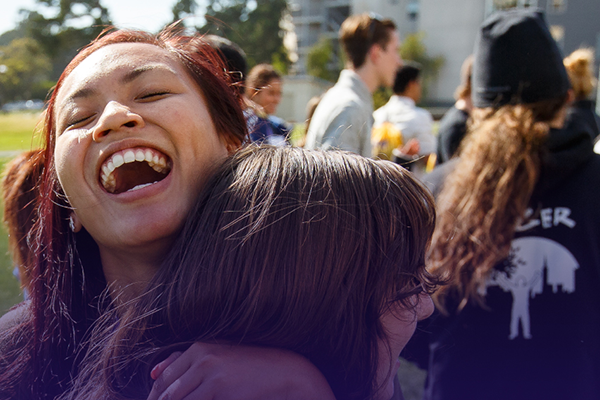
Students are invited to join the Recreation, Parks, Tourism and Holistic Health Department for a celebration Wednesday, March 20, 4 – 5 p.m., in HSS 306.
This event presents an opportunity to connect with fellow students, teaching assistants and faculty members; ask questions about the programs; and explore new academic and career options. Refreshments will be served.
For questions, please email Erik Peper.
Join SF Hillel for a mask-making event Thursday, March 21, noon – 2 p.m., on the Quad. The event celebrates the festive Jewish holiday of Purim.
Victoria Cary will lead a meditation and discussion centering experiences of Black students on campus on Thursday, March 21, 3 – 4 p.m., in HSS 306. Cary is a meditation teacher and co-founder of the San Francisco Black Indigenous People of Color Insight Sangha.
This event is presented by the Institute for Holistic Health Studies.
For questions or to RSVP, please email Jennifer Daubenmier.
Academic Technology and the Center for Equity and Excellence in Teaching and Learning invite faculty of online courses to register for “Excellence in Online Pedagogies.”
The “Excellence in Online Pedagogies” course covers essential approaches to designing online synchronous and asynchronous courses. Expect to design or refine online courses by engaging in five modules over 10 hours.
Topics include:
- evaluating online courses using quality standard rubrics
- orienting students to online learning expectations
- addressing the digital divide and inequities through course design
- developing engaging, inclusive and collaborative online activities and assignments
- humanizing online courses and creating social and cognitive presence
- teaching strategies related to artificial intelligence
The course launches Tuesday, April 2, and runs until Friday, April 26. Faculty who complete 10 hours and the course deliverable within this time frame will receive $500.
Seats are limited in this course; priority will be given to those teaching online synchronous and asynchronous courses in upcoming semesters. Please sign up via Qualtrics.
SF State’s Staff Council and the Staff Enrichment Committee invite the campus community to the Staff Spring Craft Fair on Wednesday, April 3, 9 a.m. – 3 p.m., in Library 121.
If you are interested in participating, please email Anarose Schelstrate or the Staff Council by Wednesday, March 20, at 5 p.m. to secure a space. Spaces include a 2-foot by 5-foot table with two chairs. Spaces will be assigned on a first-come, first-serve basis.
Participants must arrange leave from work with their supervisor. All products must be handmade by participants.
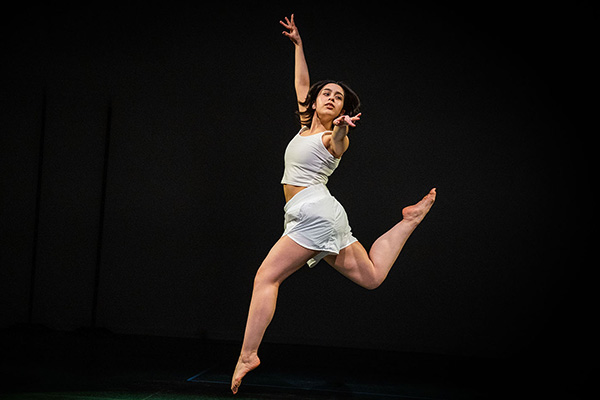
The School of Theatre and Dance presents “University Dance Theatre 2024,” featuring choreography by Kara Davis, Katerina Bousleli and Ray Tadio. This showcase comprises an ensemble of 23 student dancers.
The show opens Friday, April 5, at 7 p.m. Other performances are Saturday, April 6, at 2 p.m. and 7 p.m., and Sunday, April 7, at 2 p.m. with a talkback after the performance. All performances are in the Little Theatre (Creative Arts 107).
Photo by Chani Bockwinkel
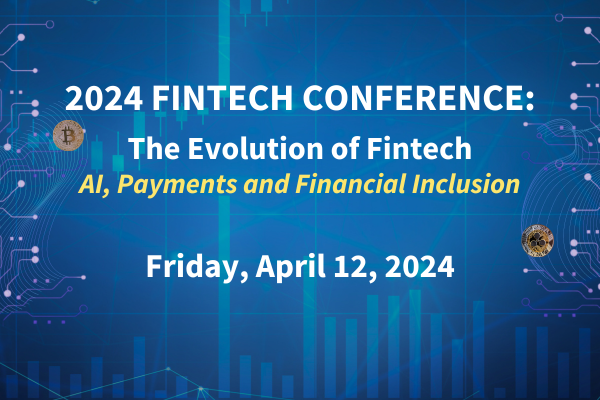
The 2024 Fintech Conference, “The Evolution of Fintech: AI, Payments and Financial Inclusion,” will be held Friday, April 12, at the SF State Downtown Campus, 160 Spear St. Hosts are the Lam-Larsen Fintech Initiative at the Lam Family College of Business, the Federal Reserve Bank of San Francisco and the Center for Analytical Finance (CAFIN) at University of California, Santa Cruz.
This annual conference offers an opportunity to learn from top experts from industry, academia and regulatory authorities as they engage in rich discussions about the latest trends in fintech and sustainable finance. The conference is open to everyone.
Attendees may join the conference in person or via Zoom. Admission is free. In-person attendees will enjoy a complimentary breakfast and lunch.
Registration is required by Friday, April 5, at 5 p.m. For more information and to register, please visit the 2024 Fintech Conference page.
Campus Recreation has a $15 sale on general admission for this year’s annual 5K Run, Walk & Roll that ends Saturday, March 23. The event date is Saturday, April 13.
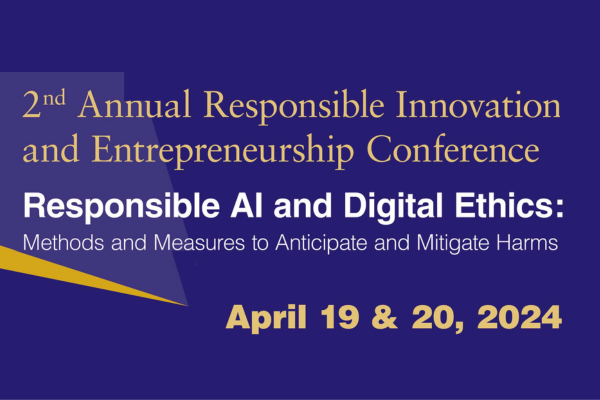
The annual Responsible Innovation and Entrepreneurship Conference will be held Friday, April 19 – Saturday, April 20. Hosted by the Lam Family College of Business, the conference engages the innovation and entrepreneurship research community in thoughtful discussions on the latest developments in this field, workshops to support research paper development, and research ideation sessions.
The theme for this year’s conference is “Responsible AI and Digital Ethics: Methods and Measures to Anticipate and Mitigate Harms.” The deadline for registration and conference fees is Wednesday, April 10.
For more information and to register, please visit the Lam Family College of Business website.
Join other Gators to give back to the Bay Area community on Wednesday, April 10, 3 – 5 p.m., at the University Club, Cesar Chavez Student Center.
Staff and faculty are invited to an ally training on “Understanding Jewish identity and Antisemitism” Friday, April 19, noon – 2 p.m., in the University Club, Cesar Chavez Student Center.
This training is for staff and faculty only. It will provide an opportunity to learn about Judaism, how antisemitism manifests and how the University can better support Jewish students who may experience instances of antisemitism.
Celebrate the end of the academic year with Gators of faith! The event takes place Friday, May 10, noon – 3 p.m., in the University Club, Cesar Chavez Student Center.
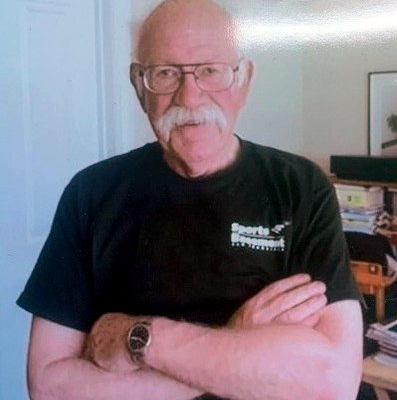
Anatole Ben Anton passed away at the UCSF Medical Center, on Dec. 25, at age 84 after an 11-year struggle with Lewy body dementia. Kathryn Kenley-Johnson, his partner and wife of 31 years, and Glenna Anton, his beloved and devoted daughter, were by his bedside.
Born on April 18, 1939, Anton grew up in New York’s Greenwich Village. His father, an abstract expressionist painter, shaped his lifelong interest in the arts and humanities. Obtaining his Bachelor of Arts from City College of New York, he earned his Ph.D. in Philosophy from Stanford University.
Anton was a teacher, a scholar and an activist. He taught Philosophy at SF State (1967 – 1971); University of Colorado, Boulder (1971 – 1975) and (1976 – 1977); and various Bay Area colleges. In 1984, he returned to SF State as a tenured professor where he served until his 2006 retirement, as department chair, as general editor of the San Francisco State Series in Philosophy, and as a key member of the SFSU Faculty Student Mentorship Program.
Although well-versed in analytic philosophy through his training at Stanford, Anton developed his academic interest in Marxist philosophy and his commitment to social justice during a blockade-busting trip to Cuba with a group of students in 1963, when such travel was illegal. The trip included a seminar with Che Guevara and Fidel Castro.
Anton served on the editorial board of Capitalism, Nature and Socialism, was a founding member and co-coordinator of the Radical Philosophy Association, and a frequent panelist at the annual New York Socialist Forum.
In addition to publishing articles and numerous book reviews, Anton co-edited several anthologies: “Not for Sale: In Defense of Public Goods” (2002) with Milton Fisk and Nancy Holmstrom, “Towards a New Socialism” (2006) and “Taking Socialism Seriously” (2012), both with Richard Schmitt.
In the 1960s, SF State was a hotbed of student Vietnam War protest and the site of a student-led strike organized by the Third World Liberation Front to fight for an ethnic studies curriculum and the ultimately successful creation of the College of Ethnic Studies (1968 – 1969). As a young assistant professor at SF State, Anton convened the Ad Hoc Faculty group, which succeeded in convincing the American Federation of Teachers’ SF State chapter to go on strike in support of student demands.
Anton is survived by his wife, Kathryn; his daughter, Glenna, and her husband, Amir, and their two children, Django and Ashi Buchbinder; Kathryn’s son, David Johnson-Igra, and his wife, Kelly Earls, and their children, Maya and Casey Igra; his brother, William Anton, and his wife, Karen, and their children, John, Nanao, Mie, Mario and Lila; his 11 grandnieces and nephews; his former wife, Bette Bentzman Anton; his first cousin, Julie Feibush; his daughter-in-spirit, Geraldine Urquidez; and his circle of caring friends, Joe Blum, Bob Davis, Levi Laub, Carolyn Loeb, Richard Peterson, Mike Pincus, Carol Seligman and Peter Shapiro, whose love and affection sustained him.
Anton’s family and friends extend thanks to the Health and Wellness Team at Frank Residences, Campus for Jewish Living, for their excellent care and to his longtime caregivers, Jason Adams and Alfonzo Smith.
Anton’s family and friends remember him for his powerful intellect, his big heart, fiery passion and profound depth. His penetrating and critical understanding of the world and his fight for social justice did not make him cynical or pessimistic, even during the darkest of recent times. Though self-described as a radical, he was never dogmatic. His abilities as a scholar and activist to communicate that understanding profoundly influenced those around him. He was a valiant human being with a vast and general soul.
Donations in Anton’s memory may be made to Doctors without Borders USA, P.O. Box 5030, Hagerstown, Maryland 21741-5030.
SF State Spotlight
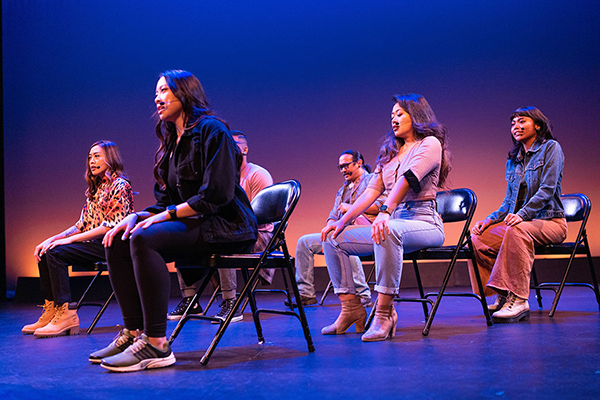
“Larry the Musical,” a play created by SF State alumni, tells the story of a little-known Filipino American activist. The production is based on the book “Journey for Justice: The Life of Larry Itliong” by the late SF State historian Dawn Mabalon and alumna Gayle Romasanta (’99). The book and musical chronicle the life of Itliong, an organizer who led protests alongside Cesar Chavez for West Coast cannery and farm workers demanding fair pay and improved working conditions.
Romasanta, a writer who has dedicated her career to telling stories about the Filipino American experience, connected with Itliong’s story because it speaks to her own immigrant experience. (She was born in Manila and immigrated to Stockton with her family in the 1970s.) Despite the struggles Itliong faced as an immigrant, he fought for the rights of Filipino Americans and other workers. Romasanta wanted more people to know Itliong’s story, so she approached her friend Bryan Pangilinan (M.Mus., ’15), a composer, about bringing it to a wider audience. He agreed, and together they collaborated with fellow alumni Sean Kana (B.A., ’04), Kevin Camia (B.A., ’95) and Asian American Studies Professor Allyson Tintiangco-Cubales to create the musical production.
“‘Larry the Musical’ is the first 100% Filipino American-created musical,” said Pangilinan, the musical’s composer and executive producer. “It’s important to know our history and learn from it. Knowing what our ancestors’ challenges were, including racism and violence, is a call to action for us and should inspire us in our daily practices.”
Romasanta and Pangilinan decided that a musical would be the best vehicle for the story — easily accessible for diverse audiences from different generations. “Musically, it’s like a halo-halo [Filipino dessert where you mix everything] mixtape, infused with musical spells and genres that we grew up with and were influenced by,” Pangilinan said.
Romasanta, executive producer and writer for the production, says her writing career began at SF State. She earned her MFA in Creative Writing in 1999 and has used her writing to be a voice for the Filipino American community.
“[SF State] is full of activists, progressive thought, deep rich ideas and academics supporting that thought,” she said. “I blossomed exponentially and I felt like I immediately found the place I needed to be.” She dedicates her life’s work and purpose to her ancestors, who she is constantly calling upon for guidance, and the impact it will leave on her four children.
Pangilinan also credits his talent in music to SF State, where he earned his master’s degree in Music. SF State Professor David Xiques and former SF State School of Music faculty member Alissa Deeter helped him hone his talent. “They created a safe and supportive environment where I could grow my musical skills, techniques and expertise,” he said.
Itliong’s story is important for everyone to know, but it’s especially personal for Romasanta. “I have deep roots with the Manong generation, the generation of immigrant farm workers,” she said. “I was raised by that generation, those Filipino American men and families.”
“Larry the Musical” opens Saturday, March 23, at 8 p.m. at the Brava Theatre in San Francisco. It runs through April 14.
A 30% discount on regular-priced tickets is available to students, seniors, community members and persons with disabilities. This discount is valid for shows running Wednesday, March 27 – Sunday, April 14. Use the discount code LARRY30 when purchasing tickets online. Offer ends Friday, March 22.
In a new PLOS ONE paper, University researchers and their collaborators share how they leveraged the University’s San Francisco Building Infrastructure Leading to Diversity (SF BUILD) program to respond to the unprecedented events of 2020. They pivoted to create a Virtual BUILD Research Collaboratory to train Black, Indigenous and People of Other Color (BIPOC) students to use their unique perspectives in biomedical research.
The program shifted the regular in-person curriculum into an eight-week summer coding program where students conducted research on health disparities due to COVID-19. The program used a culturally responsive pedagogical structure and leveraged students’ community cultural wealth. SF BUILD led the collaboratory and offered programing to nine other National Institutes of Health BUILD sites.
Survey assessment of the program revealed that participants reported an increase in science identity and a decrease in perceived stress. After the program, students reported high scores of agency and cultural humility. The authors recommend Science, Technology, Engineering and Math (STEM) education programs use and test intentional design using culturally relevant pedagogy.
In a new Patterns Opinion piece, Professor Leticia Márquez-Magaña discusses the need for science to be anti-deficit.
In higher education and science, institutional barriers create systemic racism that contribute to the exclusion of racial and ethnic minorities in science. This is amplified by deficit-based thinking that erases/masks cultural assets necessary to counter bias and drive innovation. Márquez-Magaña calls for a shift to asset-based approaches that value cultural strengths, instead of efforts that try to correct perceived deficiencies in individuals. This will help foster inclusive and innovative research that leads to equitable solutions.
Tonya Foster, the George and Judy Marcus Endowed Chair in Poetry, presented a one-hour talk on Sunday, March 10, at the American Association of University Women meeting in Pacifica. Her talk was in honor of Gertrude Stein to mark the 150th anniversary of her birth.
As co-host of ABC News’ “Countdown to Oscars: On the Red Carpet Live!” on March 10 before the Academy Awards, Whit Johnson (B.A., ’04) interviews fellow SF State graduate Annette Bening (B.A., ’80). They discuss her Oscar-nominated role in the biopic “Nyad.”
Following the pre-recorded interview, Johnson’s ABC co-host Linsey Davis notes that he and Bening have something in common.
“Yeah, we both went to San Francisco State University. Go Gators!” Johnson responded. “We were bonding over our California roots. It was fun.”